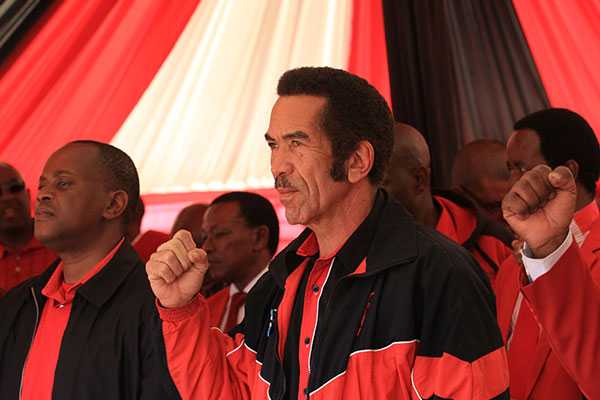BDP chickens are coming home to roost
Botswana Democratic Party’s transition to the presidency has never ever been smooth.
It started after the demise of founding president, Sir Seretse Khama when tensions arose within the party with aspirants jostling and positioning themselves for the coveted post ahead of Sir Ketumile Masire.
Although the majority BDP-led parliament eventually chose Masire, the writing was clearly on the wall that the presidency was a source of division within the ruling party. Masire was deputised by Lenyeletse Seretse then Peter Mmusi and later Festus Mogae, who would eventually become the country’s third president in 1998.
But, once again that was not without infighting between the party’s Old Guard and Young Turks. Festus Mogae then brought in Khama from the army barracks to deputise him, again opening the wounds of factionalism. But Mogae insisted that Khama was a unifying factor that would heal the warring factions.
But there were dissenting voices. At the Palapye congress some wanted Khama to take the party chairmanship from Ponatshego Kedikilwe but he declined saying he wanted to understand the party first.
Mogae endorse Khama
But to the surprise of many, in 2003 Khama opted to take over from Kedikilwe without first having the courtesy to inform the very person who had offered the chair a few years ago. Instead it was first announced by Mogae who requested the Democrats to vote for Khama as the chairman of the party during the women’s congress in Mmadinare.
Kedikilwe did not take kindly to this as did many of his followers. Mogae defended his position by saying Khama is his vice and confidante and he was duty bound to support him in all his endeavours. Khama won the closely-contested elections in Gantsi.
Once again BDP infighting reared its ugly head when the party went for its 2008 congress in Kanye. At this conference Khama supported Tebelelo Seretse - Jacob Nkate group. But the group failed dismally and lost all positions to the Daniel Kwelagobe – Gomolemo Motswaledi group which was also known as Barata Phathi.
Seeing that he’d been beaten Khama pulled the carpet under the feet of the winning group by choosing all Sub-committees without consulting the central committee. The move caught Barata - Phati napping as they had expected to be called for a meeting.
That was the beginning of many differences. Motswaledi, then Secretary General, questioned many decisions and Khama suspended him for 60 days. He sought redress at the high court but the case was dismissed on a technicality because a sitting president enjoys immunity against prosecution.
The BDP feuding ultimately led to the party’s split and formation of Botswana Movement for Democracy (BMD). Its MPs - Phillip Makgalemele, Patrick Masimolole, Guma Moyo, Botsalo Ntuane, Odirile Mothala, Gilbert Mangole and Wynter Mmolotsi resigned to join BMD.
But most of them later returned save for Mangole and Mmolotsi. By then Khama was too strong and he won the general election with a convincing margin of 38 parliamentary seats, but with a diminished popular vote.
The situation is completely different today.
Although currently in disarray, the opposition has proven that it can still win as they did with by-elections in Mochudi East, which were in the hands of BDP.
This poses real doubts about BDP’s ability to win 2019, that is unless they unite now.
This week’s bold decision to postpone Bulela- Ditswe primary elections in all BDP’s strongholds and constituencies where they are incumbent may have far-reaching implications.
Firstly, the Independent Electoral Commissions (IEC) has called voter registration for 3rd September until 11 November 2018 and due to the new amendment to the Electoral Act, there will not be supplementary registration as it has been the norm.
Political commentators say the idea of BDP having primary elections in August and, or before was to ensure that party candidates are identified and start mobilising voters to register for the election.
The BDP delay will disadvantage them as their ability to mobilise voters will be affected because they do not have candidates.
Secondly, delaying the primary elections in its key constituencies could prove detrimental for BDP as it runs the risk of failing to resolve the appeals and subsequent counselling that will arise from the primary elections.
Thirdly, next year will be a tight year with the main focus being general election which will be held sometime in October. But, serious focus for general election starts in February where attention switches from one elective congress.
The first congress is the Youth congress in February, then followed by the Women either in March or April, finally the main congress in July.
If the first two congresses could start before the party is done with its appeals then there will be disaster for the BDP because both the youth and the Women’s elective congresses always set the tone for the main congress in terms of who will win.






